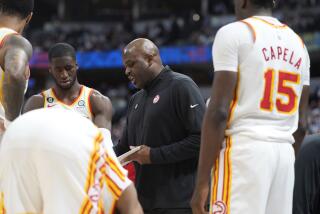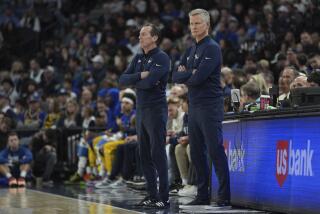Scott Has the Nets Flying High
- Share via
Back when he hired Byron Scott to coach the wretched Nets in June 2000, team President Rod Thorn spoke of Scott as a guy who could cover “every possible conceivable situation that could happen on the basketball court.”
Sure, Scott had an excellent basketball pedigree, having won three championships with the Lakers. Sure, he counted Pat Riley and Larry Brown, for whom Scott played, among his coaching mentors, as well as Rick Adelman in Sacramento, where Scott served two seasons as an assistant. Scott also had youth and energy going for him, making him a good candidate to emulate the recent success of players-turned-coaches such as Scott Skiles, Larry Bird and Doc Rivers.
But the one thing that most blew away Nets management was Scott’s knowledge of the game. Thorn described a five-hour session in Chicago in which he sat with Scott and a magnetic board, watching Scott push 10 magnets through a series of game situations. Half court offense and fast breaks. Defenses, double-teams, rotations. End-of-game possibilities, down by one, up by three, 30 seconds left, 20 seconds, 10 seconds. Scott had it all covered. A week later, he was coach of the Nets.
Knowing Xs and Os helps little, though, if you have no Xs or Os with which to work. That was Scott’s curse in his first season as Nets coach. The Nets finished 26-56. Scott describes last season, when injuries ravaged the Nets, as “frustrating.” Star point guard Stephon Marbury missed 15 games, forward Keith Van Horn missed 32 games and guard Kerry Kittles missed the entire season. A leg injury forced center Jayson Williams to retire. At times, Scott lashed out at his players, including No. 1 overall draft pick Kenyon Martin.
Fast forward a year, and the Nets are on top of the Eastern Conference at the All-Star break. Credit for the Nets’ turnaround has been heaped on new point guard Jason Kidd, and it is deserved. Kidd has been sensational and has earned MVP consideration. Credit also has been given to Thorn, the man who brought Kidd to the Nets and took successful gambles on free-agent center Todd MacCulloch and rookie swingman Richard Jefferson. Thorn deserves Executive of the Year consideration. Credit also belongs to salubrity.
New Jersey has been able, for the first time in recent memory, to keep its team in good health.
But don’t discount the contributions of Scott, who coached the East team in last week’s All-Star Game, to the wondrous turnaround. The team was 32-15 at the break, its best record at the break in its 25-year NBA history. As good as the Nets have been, this team defies the conventions of the modern NBA. There is no great scorer. There is no 1-2 punch.
The Nets have Kidd, not much of a shooter himself, and a handful of slightly above-average players such as Martin, Van Horn and Kittles. Journeymen Aaron Williams and Lucious Harris are the top reserves, and rookies Jefferson, Jason Collins and Brian Scalabrine also are contributing. The team is playing better than the sum of its parts, a sure sign of good coaching.
Scott has stressed defense and toughness, something he demonstrated personally in November in an overtime win over the Jazz. During the second quarter, Scott was on the floor attempting to calm Martin and was pushed by Jazz forward Karl Malone. Scott had to be restrained from going after Malone, and got into a shouting match, telling Malone he had “no heart.”
After the game, Scott added, “Malone don’t scare me like nobody else in this league.... I don’t back down from anybody. As a player, I didn’t, and I’m not going to do it as a coach. I’ll meet him after the game if he wants.” Scott, mind you, is 6-foot-4, 200. Malone is 6-9, 256.
Scott’s lessons in toughness have paid off. Rebounding and defense have been the cornerstones of the Nets’ success, an odd turn for a team that traditionally ranks among the league’s worst in both categories. New Jersey entered the break allowing 92 points a game, fourth in the league. Opponents were shooting 42.2 percent, which ranks third. The Nets were grab 44.3 rebounds a game, sixth overall. Most of all, Scott finally has the right players to showcase the reason the Nets originally hired him: his skill with Xs and Os.
For six years, as his playing career wound down and while assisting Adelman in Sacramento, Scott jotted down in notebooks things he learned about the game. But during the utter flop that was his first year, Scott was not able to utilize any of what he had learned. It was difficult enough just trying to figure out who was available to play each night.
Now, Scott has tailored a terrific offensive scheme around his personnel, allowing his team to maximize the presence of Kidd’s precision passing. The Nets run full-throttle when fast-break opportunities are available. When they go to half court sets, the notebooks come in handy. Scott relies heavily on the motion offense and backdoor cuts he learned from former Princeton Coach Pete Carril, who was part of the Kings’ staff during Scott’s coaching apprenticeship. No team outside of Sacramento shares the ball as well as the Nets.
It has taken a while for New Jersey to come together offensively--the Nets were shooting 43.3 percent in the first two months of the season. But since Jan. 1, the Nets have shot a couple of percentage points better, a sign that the offense is improving.
It still can be slowed with a good defensive plan. That’s what Dallas had last week. The Mavericks sent two or three defenders back on each possession to guard the break, used a zone to stop Kidd’s penetration and forced New Jersey to settle for outside shots, holding the Nets without a field goal for the last 4:25.
But don’t worry. Surely, it all went down in Scott’s notebook.


